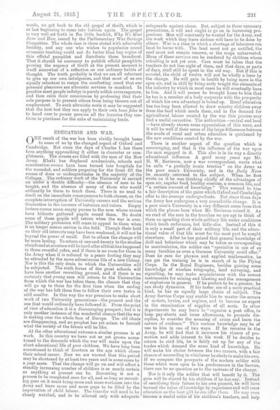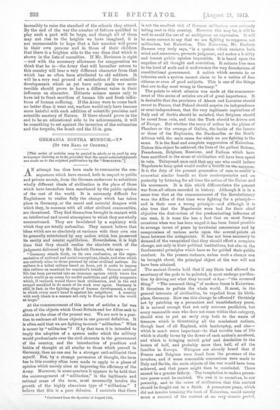EDUCATION AND WAR.
ONE result of the war has been vividly brought home to some of us by the changed aspect of Oxford and Cambridge. Not since the days of Charles I. has there been anything approaching it either in character or com- pleteness. The streets are filled with the men of the New Army. Khaki. has displaced academicals, schools and examination-rooms have been turned into hospitals for the wounded, and soldiers preparing for the front fill the rooms of dons or undergraduates in the majority of the Colleges. The ordinary work of the University is carried on under a double difficulty—the absence of men to be taught, and the absence of many of those who would ordinarily be there to teach them. There is no need to dwell on the immediate consequences to both classes, on the complete interruption of University careers and the serious diminution in the incomes of lecturers and tutors. Empty lecture-rooms mean empty purses to the men whose names have hitherto gathered pupils round them. No doubt some of these pupils will return when the war is over. The military profession will cease to appeal to them when it no longer means service in the field. Though their hold on their old interests may have been weakened, it will not be hoyowl the power of recall. But to others the change will be more lasting. To return at one-and-twenty to the studies abandoned at nineteen will be hard after all that has happened in those eventful yews, and if there is no room for them in the Army when it is reduced to a peace footing they may be attracted by the more adventurous life of a new Colony. Nor is this the only drain to which the Universities will be subjected. The sixth forms of the great schools will have been another recruiting ground, and if there is no certainty that young men will return to the Universities from which the war has taken them, the chance that they will go up to them for the first time when the ending of the war has left them free to follow their own tastes is still smaller. In this way the war promises to make short work of two University generations—the present and the one that would ordinarily have followed it. From the point of view of education it is a discouraging prospect; but it is only another instance of the wonderful change that the war is making over the whole face of Europe. The old ideals are disappearing, and no prophet has yet arisen to foretell what the society of the future will be like.
At the other educational extreme a similar process is at work. In this country we have not as yet grown accus- tomed to the demands which the war will make upon the short educational life of poor children. We have long been accustomed to think of fourteen as the age which closes their school career. Now we are warned that this period may be shortened by at least two years and in some cases by a year more. That the change will go on and will affect a steadily increasing number of children is as nearly certain as anything at present can be. Recruiting is not a process to be completed once for all, and so long as recruit- ing goes on it must bring more and more workmen into the Army and leave more and more gaps to he filled by the importation of child labour. The transfer will need to be closely watched, and to be allowed only with adequate safeguards against abuse. But, subject to these necessary precautions, it will and ought to go on in iucreasing pro- portions. Mon will constantly be wanted for the Army, and the work which they leave undone will have to be done by others. War is a time in which a shortage of labourers can least be borne with. The land must not go untilled, the seed must not remain unsown, or the crops unharvested. Many of these services can be rendered by children whose schooling is not yet over. Care must be taken that the teachers do not lose sight of them, and that days, or parts of days, shall still be spent in the old way. But if this is secured, the child of twelve will not be wholly a loser by the change. He will gain in health by being more in the open air, and in skill by being early taught the elements of the industry by which in most cases he will eventually have to live. And it will sooner be brought borne to him that he too is a member of a body corporate with the prosperity of which his own advantage is bound up. Rural education has too long been allowed to draw country children away from the laud which needs them, and in the demand for agricultural labour created by the war this process may find a useful corrective. The authorities—central and local —have already shown some appreciation of this want, and it will be well if their sense of the large differences between the needs of rural and urban education is quickened by the new conditions created by the war.
Thera is another aspect of the question which is encouraging, and that is the influence of the war upon the men engaged in it. This also is in its way a directly educational influence. A good many years ago Mr. H. W. Nevinson, now a war correspondent, wrote what he calls " a partially ironic treatise" on the Army as the poor man's University, and in the Daily News lie recently returned to the subject. When he first wrote on it he was thinking chiefly of the advantages of open air, regular food, healthy exercise, a common life, and " a certain amount of knowledge." This seemed to him a fair description of the gains which Oxford and Cambridge offer to the average undergraduate. But since those days the Army has undergone a very remarkable change. It is a poor man's University in a very different sense from that which the phrase bore when Mr. Nevinson coined it. As we read of the men in the trenches we are apt to think of them as spending their whole military life under conditions which teach endurance, but little else. Instead of this it is only a small part of their military life, and the educa- tional value of that life must for the most part be sought elsewhere. After he has gained that general knowledge of drill and behaviour which may be taken as corresponding to matriculation, the soldier can " specialize in one of as many faculties as oven a German University could offer." Does he care for physics and applied mathematics, he can get the training he is in search of in the Flying Corps. In the Royal Engineers, besides gaining some kuowledge of wireless telegraphy, land surveying, and signalling, he may make acquaintance with the newest instruments for mining and blasting and the management of explosions in general. If lie prefers to be a gunner, he can study dynamics. If his tastes are of a more practical kind, he has an equally large choice of subject. The Army Service Corps may enable him to master the secrets of motors, lorries, and engines, and to become an expert in the examination of supplies of all sorts. In other departments he may learn to " organize a post office, to keep pay-sheets 'and issue allowances, to promote dis- cipline, to consider the meaning of crime and learn the nature of evidence." This various knowledge may be of use to him in one of two ways. If be remains in the Army, he will find that it increases his chance of pro- motion and adds interest to his work. If he decides to return to civil life, he is fairly set up for any of the trades which demand the same kind of knowledge. He will make his choice between the two careers, with a fair chance of succeeding in whichever he elects to make his own. If we compare the prospects of the modern soldier with those which were open to his predecessors in the Service, there can be no question as to the vastness of the change.
Nor is it only the soldier that will benefit by it. The gain will be shared by his children if lie has any. Instead of sacrificing their future to his own present, he will have learned the value of knowledge by experience and will treat education as the best gift he can offer them. He may even become a useful critic of his children's teachers, and help insensibly to raise the standard of the schools they attend. By the end of the war the number of fathers qualified to play such a part will be large, and though all of them may not rise to the heights we have imagined, it is not unreasonable to hope that a fair number will prove in their own persons and in those of their children that there is a brighter side to the war than that which is shown in the lists of casualties. If Mr. Nevinson is right —and with the necessary allowance for exaggeration we think that he is--the Army that will hereafter return to this country will bear a very different character from that which has so often been attributed to old soldiers. It will be a very real ground of satisfaction if the scientific developments which as yet have only made war more terrible should prove to have a different value in their influence on character. Hitherto science seems only to have led to fresh sacrifices of human life and fresh inflic- tions of human suffering. If the Army were to come back no better than it went out, warfare would only have become more hateful with each addition of scientific precision and scientific mastery of Nature. If there should prove in the end to be an educational side to its achievements, it will be something to set against the invention of the submarine and the torpedo, the bomb and the 15 in. gun.



































 Previous page
Previous page